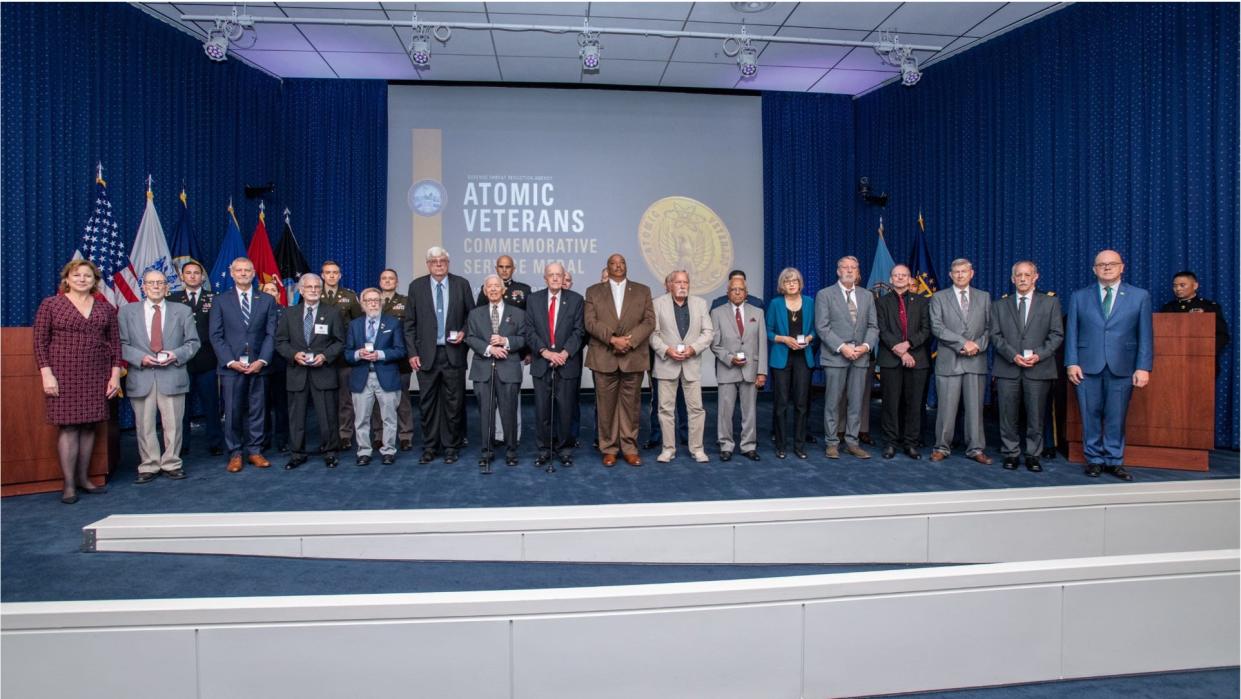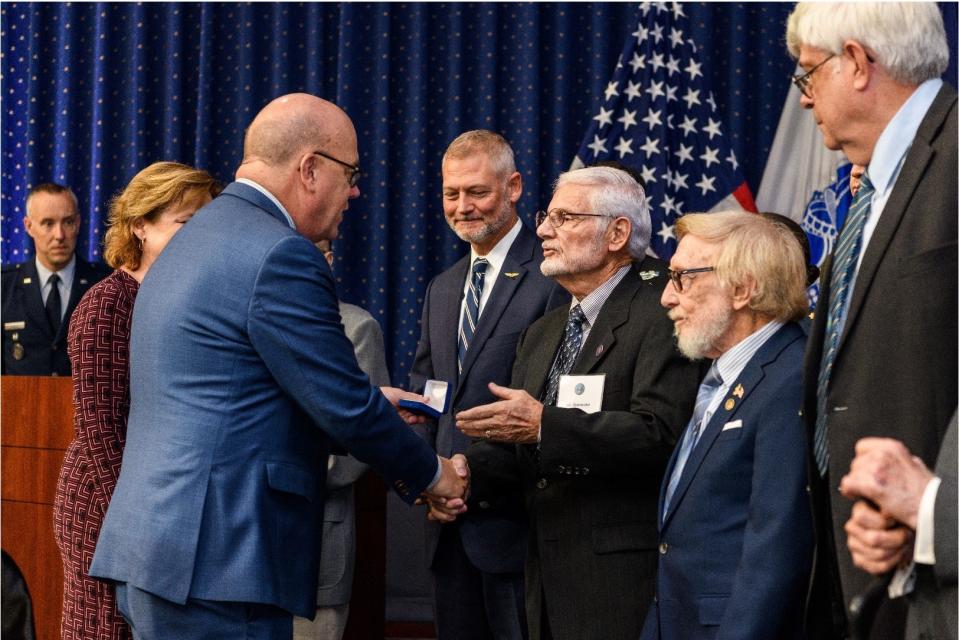Atomic veterans were sworn to secrecy for years. Now they're getting recognized

In the 1950s and early 1960s, the Pentagon conducted numerous nuclear bomb detonations in the American Southwest and the Pacific Ocean. These tests involved “atomic soldiers” who observed, worked on or supervised the explosions to study the effects of radiation exposure.
Nearly six decades have passed since those events, and the U.S. Department of Defense is recognizing these soldiers with a commemorative medal. Today, most of these veterans have died, with cancer and old age causing the number of survivors to dwindle.
Holland resident Ron Benoit, who grew up during World War II, was drafted into the Army in 1953 and trained as a military police officer. He and 29 other MPs were sent to the Marshall Islands. Benoit was aboard ship with other servicemen to witness hydrogen bomb tests.
“When that bomb went off, we had glasses on you couldn’t even see the sun with,” Benoit said. “The bomb was 1,000 times bigger than the atomic bomb in Japan.”
After the tests were over, all the servicemen were put below deck as the deck was washed down using water from the Pacific in an attempt to clean the radiation from the nuclear fallout.
Since Benoit was an MP, his job was to stay by the doors to make sure no servicemen snuck out or tried to open the door during this process. Unfortunately, he was stationed outside the door, causing him to be exposed to more radiation.
“It’s like [the Pentagon] doesn’t want to admit what happened,” Benoit said. “I wish it’d be known, at least admit what the hell happened.”
Joe Mondello from Shrewsbury was initially given orders to go to Korea during the Korean War to be a foreign observer directing fire against the enemy. His duties, however, changed, and he was sent to Nevada’s Camp Desert Rock, where the U.S. government tested atomic bombs.
Mondello witnessed atomic bombs tests from close range.
“It was a really dangerous mission. I really thought I wasn’t getting out of there alive,” Mondello said.
The real problem was the effects of the radiation, Mondello said.
“That was something they never brought up,” Mondello said. “You could survive the blast but in the meantime, you’re taking all that radiation in through your eyes, your nose, your mouth. If it doesn’t kill you in a few months, years later is when it shows up. That’s what happened to me.”
Once he got out of the military, Mondello started to have issues with his hearing, vision and and heart. He began losing his hair in large portions.
Mondello had to pay his medical bills out of pocket for years because he was sworn to secrecy. Atomic veterans could not tell even their doctors what they had been exposed to until the 1990s.
“Most hospitals were totally puzzled by my hair loss, they had no explanation at all,” Mondello said. “They couldn’t treat me, they didn’t know what was causing it.”
Eventually, his hair did start to grow back. Mondello called himself “lucky” because many of the soldiers in his position got cancer from their radiation exposure.
Atomic veterans had been denied government compensation until 1990, nearly three decades after the nuclear tests concluded. In 1990, the Department of Justice formed a different compensation program established by Congress and signed into law by President George H.W. Bush.
But Mondello said he only got compensation for PTSD, not health issues caused by his exposure to radiation.
In 1996, Congress repealed the Nuclear Radiation Secrecy Agreements Act, allowing atomic veterans to finally discuss their experiences without worrying about fines or treason charges.
In August of 2022, the PACT Act was signed, expanding benefits to veterans exposed to toxic substances. More than 8,000 people who helped clean up radioactive sites became eligible to apply for monthly disability payments.
While all this work is appreciated, Benoit and Mondello said they want the government to admit their wrongs.
“Just admit it, that’s all I say,” Benoit said. “I mean, Jesus. We put our lives out there that would normally get recognized for.”
Over the past 13 years, veterans like Benoit, Mondello and Leo Quinn of Worcester have worked with U.S. Rep. James P. McGovern to ensure atomic veterans are honored for their service.
After listening to the stories of atomic veterans, McGovern said he was “shocked” they were “ignored” by the government.

“I wanted to introduce a bill to give these service members appropriate recognition,” McGovern said.
McGovern successfully worked to include the legislation within defense appropriations bills that passed the House, but every time it got to the Senate, it would be dropped. McGovern believes the Pentagon had a role.
“I gotta give it to Congressman McGovern because he’s worked diligently for 13 years,” Benoit said.
McGovern wrote a letter to President Joe Biden at the start of his term, advocating for recognition of this group of veterans.
On Wednesday, the Defense Threat Reduction Agency awarded the remaining atomic veterans a commemorative service medal at a formal ceremony in Fort Belvoir, Virginia.
Mondello and Benoit said the "medal" is more like a coin. Mondello believes he deserves more for his service.
“I think it’s a joke,” Mondello said. “It’s unfortunate because a lot of the men in the military are great leaders. That job is a sacrifice.”
Benoit reiterated Mondello’s concerns. Neither Mondello nor Benoit were able to attend the service due to health troubles. McGovern said he has plans to have a ceremony honoring local atomic veterans soon.
This article originally appeared on Telegram & Gazette: Atomic veterans from Central Mass. discuss their sacrifices

